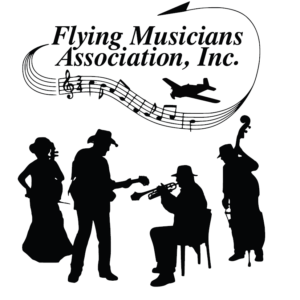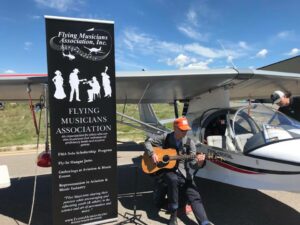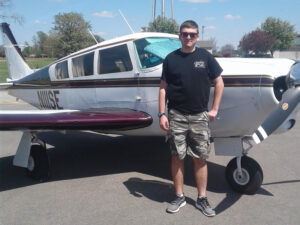No one has ever hopped in an airplane as a pilot in command for the first time and flown around the world. Just to obtain a private pilot certificate, one needs to complete at least 35-40 hours of flight training (the national average is 55+ hours completed before becoming certificated) in addition to the hours spent in ground school and studying for the FAA Knowledge Test. You’ve got to learn to crawl before you can walk or, more specifically, you have to learn to fly before you can fly solo. Aviation is a field of passion, and if you aren’t driven, there’s no way you can expect to fulfill the hours of studying and flight training to become a pilot.
 Likewise, musicianship requires a similar level of dedication and tenacity in order to achieve even intermediate proficiency. It would be wonderful if you could pick up the nearest guitar and play a Jimi Hendrix solo right away, but it takes time to get that good. There are notable similarities between piloting and playing an instrument, including the constant need for active listening and multitasking with exceptional precision. Whether it’s performing with an instrument or yoke in hand, musicians and pilots share an obligation to react swiftly to unexpected occurrences.
Likewise, musicianship requires a similar level of dedication and tenacity in order to achieve even intermediate proficiency. It would be wonderful if you could pick up the nearest guitar and play a Jimi Hendrix solo right away, but it takes time to get that good. There are notable similarities between piloting and playing an instrument, including the constant need for active listening and multitasking with exceptional precision. Whether it’s performing with an instrument or yoke in hand, musicians and pilots share an obligation to react swiftly to unexpected occurrences.
The Flying Musicians Association (FMA) is a nonprofit organization built on these commonalities, encouraging pilots to become musicians and musicians to become pilots. FMA welcomes new members of all skill levels with an instrument or an airplane. You can often find members of the organization congregating at aviation events around the country like the upcoming EAA AirVenture in Oshkosh, Wisconsin, hosting music jams and hangar concerts for event-goers.

Through the FMA Solo Program, the Flying Musicians Association supports high school juniors and seniors with a desire to fly. High school music directors can nominate their students to the program, and if one is selected as a nominee, the student’s flight training will be paid for up until his or her first solo flight (~15 hours). Through industry-provided donations, FMA will also assist students with obtaining flight training materials and the flight gear they need. The scholarships are paid for by a combination of donations, corporate sponsorships, and by hosting the popular Hangar JAMs fundraiser. Gleim supported this year’s scholarship recipients by donating copies of the Test Prep Online software as well as logbooks, bags, hats, and t-shirts.
We spoke with one of the recipients of the 2018 FMA Solo scholarship, high school senior John Laughman, to learn more about his journey with music and aviation and how they are intertwined.
Q: What sparked your interest in music?
A: I’ve always had a love for music. When I was younger, my older friends used to have so much fun just getting together to hang out and play music. I’ve been playing sousaphone, bass guitar, and trumpet over the past 6 years, and being involved with the marching band and pep band has taught me a lot about responsibility and leadership.

Q: What made you interested in aviation?
A: Aviation is in my family. My aunt owns Steel Aviation and my uncle Danny owns the Phillipsburg [Ohio] Airport. Uncle Danny took me for a flight, and I was able to see a different view of the world and the area where I live. Soon after, I would mow lawns at the airport and do odd jobs in exchange for more flights.
Q: How did you become involved with the Flying Musicians Association?
A: I actually had never heard of the Flying Musicians until one day my band teacher mentioned them to me. Seeing as I was already involved with aviation, at least on the ground, he thought it would be right up my alley and nominated me for the Solo scholarship.
Q: What’s the status on your aviation training? What do you intend to do after you’ve completed your training?
A: So far, I’ve logged 5 hours of flight time with my instructor, Ken Cruel. After obtaining my Private Pilot certificate, my goal is to first get my Airframe and Powerplant licenses so I can fix and maintain planes. Then I’ll also work up to my commercial pilot license in order to fly larger aircraft all over the country and world. I’m interested in seeing new places and meeting new people all over.
Q: Do you have any connection to Gleim training products?
A: I used the Test Prep software in order to prepare for my FAA Knowledge Test. It was easy to follow, and because the Test Prep software is so similar to the actual test, the studying I did easily translated to success on the exam.
Gleim would like to congratulate John Laughman and all the FMA Solo scholarship winners and nominees! We wish you the best of luck on your journey in aviation and are excited to have the opportunity to help you achieve your dreams!
Written by Austin Scott, Marketing Assistant for Gleim Aviation
About the Flying Musicians Association, Inc.
The Flying Musicians Association (FMA) is a 501(C)(3) nonprofit corporation of pilots who are musicians spanning the globe of all proficiency levels and genres. We want to share our passions in order to inspire, educate, and encourage through performances, presentations, networking, and scholarships.
Donate or arrange a bequest! If you believe in the joys of music and flying, and the future of both, there is no better way to make a lasting difference. We’re doing it together, one student at a time. Donate to FMA
About Gleim Aviation
Since 1980, the Gleim Aviation team of pilots, instructors, writers, designers, and programmers has helped aviators pass millions of FAA knowledge and practical tests using the unique Gleim Knowledge Transfer System. Gleim is an environmentally-friendly company headquartered in Gainesville, FL.

